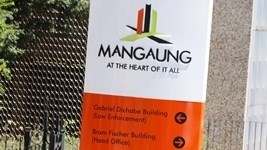Central SA
Mangaung Metro among municipalities in dire financial position─── LUCKY NKUYANE 09:59 Thu, 01 Jun 2023

The Bloemfontein-based Mangaung Metro Municipality in the Free State is among several struggling municipalities in the country which are said to be in a dire financial position.
In her report, the Auditor-General of South Africa (AGSA), Tsakani Maluleke, said the financial position of 70 (29%) of the 241 municipalities where the AG completed audits, was so dire that they had to disclose significant doubt about their ability to fully operate in future.
Maluleke said these municipalities included the City of Tshwane and Mangaung metros in Gauteng and the Free State. Maluleke added these two municipalities were responsible for 10% of the total local government budget and for service delivery to 9% of the households in the country.
The Mangaung metro is still under the national government's administration after failing to recover from its financial woes.
ALSO READ – #BreakingNews: Mangaung stripped of its powers by national government
The metro was placed under administration in 2019 following its failure to perform the most basic functions of service delivery.
OFM News previously reported that Free State municipalities – including the Mangaung Metro and Ngwathe, Metsimaholo, Moqhaka, and Matjhabeng Local Municipalities – are not complying with the Department of Water and Sanitation's Green Drop report of April 2022.
Maluleke also said these municipalities failed to take reasonable measures to prevent pollution or degradation of the adjacent environment or water resources.
ALSO READ: Ailing Free State municipalities flagged by Auditor-General
“Local government is financially distressed due to reduced revenue and funding, and that municipalities were not prudently spending the limited funds available. Many of these municipalities made this disclosure multiple times over the term of the previous administration. This means that they were not fully operational for many years as a result of their financial position. Typically, these are the municipalities that do not pay Eskom and water boards on time and do not deliver services at the required level.”
She alluded that when her office analysed the financial statements of the 217 municipalities with audit opinions other than disclaimed or adverse, it found 56% of them to have indicators of financial strain.
She cautioned that if not attended to, this can result in significant doubt about their ability to continue operating and that by year-end, just over half of all municipalities (52%) owed their creditors more money than they had available in the bank as they continued to spend money they did not have.
The total deficit in local government for the year amounted to R11,87 billion, while 79 municipalities (36%) had spent more money than they had generated. “As a result, municipalities were using their budget for the next year to cover their spending in the current year.
"At 32% of municipalities, their current liabilities were more than 50% of their revenue budget for the next year. This means that the 2022-23 budget will pay for spending that had already taken place, either in 2021-22 or in prior financial years. This cycle is likely to continue unless municipalities reduce their spending and generate additional revenue, which is highly doubtful given the prevailing economic conditions and overall economic outlook,” Maluleke further alluded.













